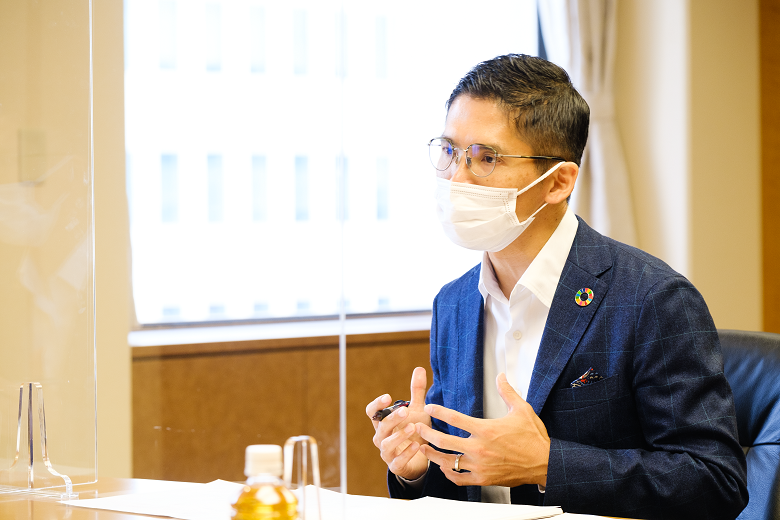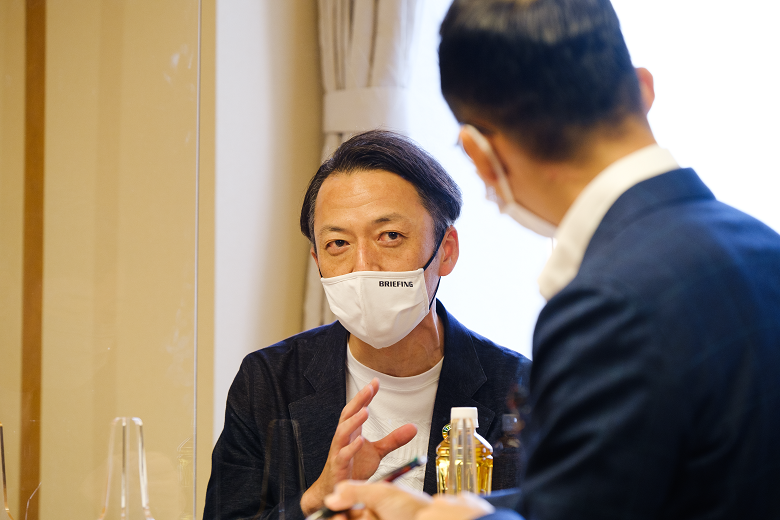
Mr.Tomioka: Last fiscal year, I worked with about 100 department and section managers at Sompo Holdings, and this fiscal year, I worked with about 200 general managers at Sompo Japan and about 270 managers at Sompo Himawari Life on the Mission-Driven 1-on-1 project. I had the impression that the corporate culture is ready to fully commit to purpose-driven management and mission-driven workstyles. This is one of the Sompo Group’s greatest strengths, and it is not something that was created overnight. Its origins lie in the organizational culture built up over the years by your people, who interact with customers and who believe that they exist for the sake of customers, society and people. The Sompo Group was established by people who share the mission-driven aspiration of its founders to protect the town and people where we live from fire. This aspiration has been handed down through the generations, resulting in mission-driven DNA being ingrained in every employee. This project fits well with this aspiration and provides an opportunity to develop it further. While many companies declare the purpose of their management, very few of them have firmly incorporated it into a system that really drives their business practices. I think that such purpose-driven business practices can be achieved only through conscientious mission-driven dialogues between supervisors and employees in their daily work.
For example, when I talk with Sompo Group employees about their MY Purpose, some of them mentioned experiences in which their health or the health of their family has been threatened, which had awakened them to their MY Purpose in their work. Until now, perhaps due to the traditional society in which we live, employees have not really had the opportunity to talk about such personal experiences and their innermost thoughts in their daily work. People grow through various experiences, and those experiences help them to find their Purpose. Daily 1-on-1 conversations between supervisors and employees may result in employees’ realizing that they have been suppressing their desire to be mission-driven, and grant them the freedom to be driven by their aspirations. The Sompo Group has now been taking on a magnificent challenge, namely to build up such a corporate culture throughout the Group.
Mr.Kato: This training made me keenly aware that many employees may have formative experiences. I am sure that many employees were skeptical when they embarked on this program. I imagine they doubted how much the program would help them improve their performance when they were already busy. However, as the program progressed, verbalizing their formative experiences enabled employees to release their thoughts and they started to empathize with the program, and it really took off. Corporate culture transformation must be people-driven. The program has been successful because it encouraged employees to empathize with why we needed to change and that such change was for the benefit of our customers and society.
Mr.Hirano: We held numerous Mission-Driven 1-on-1 workshops for employees and asked the participants to share their formative experiences and create a MY Purpose statement. Listening to their experiences, I was moved by their passionate stories and reminded of the potential of Mission-Driven 1-on-1. The aim of the initiative is not to create well-organized and clear MY Purpose statements, but for employees to realize their innermost thoughts by putting their thoughts into words as well as to connect this to their work and become able to talk about their own stories. The entire process is a lot of value and links to transforming corporate culture.
Mr.Tomioka: I think it is wonderful that not only general managers, but each and every employee can talk about their formative experiences and thoughts. Up until now, we have been driven by the single value, profit. The focus was on performance and numbers, and supervisors either did not know or had no opportunities to know what their employees wanted to achieve or about their inner aspirations. It is certainly true to say that, for now, it will be impossible to create both economic and social value unless management and dialogue focused on employee’s innermost thoughts take place between supervisors and employees.

Mr.Hirano: To promote and expand this initiative not at SOMPO but throughout Japan, it is also important to demonstrate how improvements to employees’ motivation and mindset will lead to future performance and corporate value. At SOMPO, we are trying to show how we can indicate our pre-financial value and link it to our economic value, brand and corporate value.
Mr.Kato: Looking back at the history of the Group, I do not think there have been many programs that generated so much excitement throughout the Group as these initiatives. I am keen to work on this project through to the end to see how much pre-financial value can actually be linked to corporate value.
Mr.Tomioka: For us, becoming aware of and facing our MY Purpose is the starting point, not the goal. To be frank, we have a tendency to try to live up to external expectations, and in that sense, we may not have yet reached the starting point of our own life. Until now, our social structure has not permitted us to question our mission and values. So many people are just now starting to ask themselves the question, “who am I and what is my purpose,” which is the very starting point of their own life. I think that only after reaching this starting point can we really embark on our own life. Once the number of mission-driven people has increased and they have come together, their next step is to be vision-driven and to talk about what visions to set for the future. Visions of what people want to achieve will shape society in the future.
Management that balances economic and social value will be achieved when MY Purpose of each employee at the Sompo Group leads on to their MY Vision, and then links to their MY Challenge in their current work. In the current age of no answers, it is essential to have role models who have achieved change. This in turn can lead to a new mindset in society as a whole, and the hope that our vision will be realized. I am convinced that this Sompo Group initiative will eventually change Japan.
Mr.Kato: We are receiving an increasing number of inquiries from the human resource departments of other companies about our Mission-Driven 1-on-1 program. I sense that people outside the company are able to identify with our initiatives, and I feel that our initiatives incorporate something that Japanese society as a whole has been looking for.
Mr.Tomioka: In talking with Sompo Group employees, I have discovered that they have started to discuss MY Purpose with each other without any prompting, and that they are very positive about these activities. This initiative fits in with the DNA and culture of the Sompo Group. What kind of culture do you think triggered its success?
Mr.Hirano: Various companies merged together to form SOMPO, resulting in the blending together of a number of different cultures. Moreover, we have always been credited as an enthusiastic company. But I do not think this initiative applies well to our Group only because of such background. Rather I feel that any company can successfully implement this initiative if they are serious about it.
Mr.Tomioka: The concepts of “sampo yoshi” (good for everyone), “aspirations” and “working hard for someone else” are rooted in the DNA of Japanese society. Although these concepts were suppressed by social structure during the periods of high economic growth, the original mindset is still at the heart of the Japanese people. In addition, as someone who provides support from the outside, I sense that there is a mindset unique to the P&C insurance industry and a DNA unique to the Sompo Group.
Mr.Hirano: I am sure employees have various motivations for working for a P&C insurance company, but there does seem to be a common theme, namely “great social significance.” It is certainly true that people with this kind of awareness form the core of our workforce. The sampo yoshi concept is in step with Japan’s culture and strengths, but up until now, it may have served as a paradigm to show that it is not good to put the “for my own good” concept on full display. From here on in, however, it will be important for employees to have a mindset that aims to connect and merge their purpose and mission with those of the company.
Mr.Kato: We feel that the younger generation has a new mindset, and we are concerned that young people will leave the workforce unless companies change. This is our last chance to change. Unless we change now, Japanese companies may not be able to survive.
Mr.Hirano: It is relatively easy to establish mindsets at start-ups, which are creating a new culture. However, my impression is that there are not many techniques available to change older, more traditional companies. If we can achieve such change, then we will have an enormous impact on society.
Mr.Tomioka: The Sompo Group’s strength lies in its management team being mission-driven and working together as a team. On top of that, management has been steadily working to ensure that daily mission-driven dialogues take root throughout the organization, and the accumulation of such efforts will eventually lead to substantial change. I look forward to continuing to work with you to help the Sompo Group achieve its purpose. Thank you.